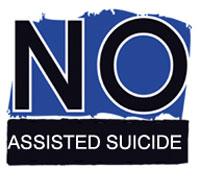Five years after the state of Oregon legalized doctor-assisted suicide, the Center for Ethics in Health Care at Oregon Health & Science University conducted research on how the law was being utilized.
Their findings, reported in the Journal of the American Medical Association, were shocking. They found that nearly 90 percent of people who ask their doctors for help in killing themselves later change their minds, and that what motivated most seriously ill people who asked was fear of pain — a fear that might be misplaced.
In one example, a man just 47-years old with amyotrophic lateral sclerosis, ALS, or Lou Gehrig’s disease, sought suicide because he was scared to die like his father, who had died from colon cancer in great pain without adequate medication. But when he learned that ALS does not cause a painful death, he gave up thoughts of suicide.
 Last week Victoria Reggie Kennedy, widow of Senator Ted Kennedy, published an op-ed against Question 2, the so-called “Death with Dignity” initiative on the Massachusetts ballot.
Last week Victoria Reggie Kennedy, widow of Senator Ted Kennedy, published an op-ed against Question 2, the so-called “Death with Dignity” initiative on the Massachusetts ballot.
In it she blasts the measure, saying it is “not about bringing family together to make end of life decisions” but is “intended to exclude family members from the actual decision-making process to guard against patients’ being pressured to end their lives prematurely.”
“Most of us wish for a good and happy death, with as little pain as possible, surrounded by loved ones, perhaps with a doctor and/or clergyman at our bedside,” she writes, “[b]ut under Question 2, what you get instead is a prescription for up to 100 capsules, dispensed by a pharmacist, taken without medical supervision, followed by death, perhaps alone.”
CLICK LIKE IF YOU’RE PRO-LIFE!
In reflecting on her own husband’s death, she closes this way: “I know we were blessed. I am fully aware that not everyone will have the same experience we did. But if Question 2 passes I can’t help but feel we’re sending the message that they’re not even entitled to a chance. A chance to have more time with their loved ones. A chance to have more dinners and sing more songs. A chance for more kisses and more love. A chance to be surrounded by family or clergy or a doctor when the end does come. That seems cruel to me. And lonely. And sad.”
LifeNews.com Note: Cathy Ruse is senior fellow for legal studies at the Family Research Council, a national pro-family group that focuses on pro-life issues and opposes abortion. Read the original here.







